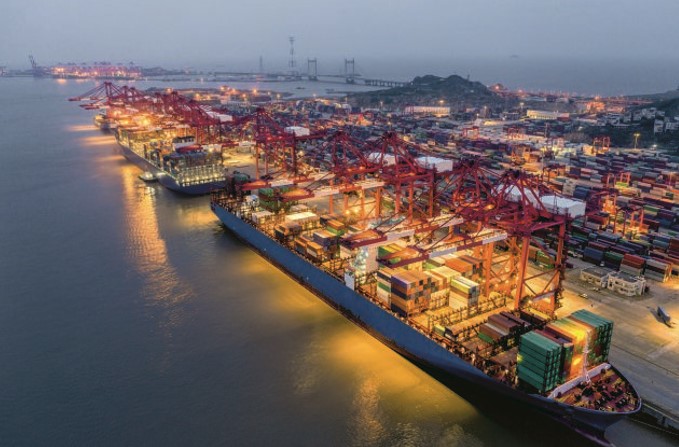
Anyone who recently tried to order a car or even just a graphics card for their computer knows that the wait will be long. The price will also be probably increased, compared to the not-so-distant past. Delays in the transport of goods and the resulting price increases are two interrelated consequences of the pandemic. According to statistics, during the period 2020–2021 freight prices increased dramatically, dragging the prices of goods along with them.
And while at the beginning of the year there was hope that the pandemic would subside and a balance would be brought about, the war in Ukraine and the pandemic wave that is hitting China came to further complicate an already difficult situation. It is estimated that the global increase in freight rates adds 1.5 percentage points to the inflation forecast for the year 2022. When one considers that almost 90% of world trade is by sea, it becomes obvious that maritime shipping is a key link in the chain of consequences of these adverse events.
Spatiotemporal mapping work
Could the consequences for sea-going shipping of events such as pandemics and wars be mitigated? And could the effects on the economy be mitigated as a result? Researchers from the University of the Aegean, who in collaboration with MarineTraffic and an international team of researchers (from Italy and the US), analysed an extremely large amount of data to investigate how the pandemic affected maritime transport, responded positively to this question. The results of this analysis were recently published in the scientific review “Scientific Reports – Nature” and constitute a kind of compass for seafarers!
But let’s start from the beginning. In order to be able to study the effect of an imponderable factor on any system, one must first carry out a basic task. That is, to be well aware of the parameters of the system under study. In this case, the system was the mobility of ships and the unpredictability of the pandemic. As Dr Dimitris Zisis, associate professor at the Department of Product and Systems Design Engineering of the University of the Aegean and a member of the research team that carried out the study, explained in Vima (Το Βήμα), “this is the first analysis of the mobility of ships over an extended period of time.” Indeed, according to the article, the researchers studied data from the routes of about 50,000 ships during the period 2016–2020. In practice this will mean that they analysed about a trillion records (!) of the position of ships, before and during the pandemic, which allowed them to make useful comparisons about the impact of the pandemic on navigation.
Generating data
In particular, the data used was collected by the company “MarineTraffic.com” via the Automatic Identification System. “AIS was originally designed as a system to ensure maritime safety, but immediately after its implementation, and especially following the mandate of the International Maritime Organisation (IMO) to install AIS transceivers on the majority of merchant ships, it became the most popular maritime traffic monitoring system,” explained the Greek professor, adding: “Today, various companies have the ability to monitor a ship throughout its journey via AIS and through complex algorithmic technical data analytics to draw useful conclusions about its course, arrival time, behaviour and other parameters.”
We live in the age of big data and recording the location of ships is a “treasure trove” of information for researchers in various scientific fields. “Although these systems are primarily aimed at ensuring the safety of navigation and the protection of human life at sea, the data collected allow the monitoring of the overall maritime traffic as well as the assessment of the economic climate through changes in the mobility of ships,” the Greek researcher notes.
The movement of ships as an ‘indicator’ of the economy
Big data, in this case the real-time recording of the movement of every vessel around the world, is a form of mine, the “excavation” of which can yield valuable economic stones. It is no coincidence that the long-term goal of researchers is to turn the mobility of ships into an indicator for the course of the economy. “Maritime shipping is a fundamental part of world trade. Our hypothesis is that changes in ship mobility can translate into changes in supply and demand at a global level and, therefore, be interpreted as a barometric of the global economic climate,” the professor explains.
In the context of this case, researchers are now studying the mobility of ships in the period 2020–2022. This period is of particular interest as it includes both the periods during which the restrictive measures were in place and the period following the lifting of the restrictive measures. “When the measures of the pandemic began to relax, we saw a very large increase in demand in the second half of 2020. Maritime shipping has not been able to accommodate this sharp increase in demand easily, and chartering more ships has not solved the problem. On the contrary, it led to overcrowding in ports,” explains Mr Zisis, saying that “for example, in Los Angeles at one time there were seventy ships waiting outside the port. These ships were loaded with goods which could not be marketed. During this period, the cost of transporting a container from China to Europe increased almost tenfold.”
Artificial intelligence as a captain
The improvement of maritime transport could have prevented the above depiction, which is particularly valuable in times of crisis such as this. “It has been estimated that the average waiting period in large ports has increased by 10% to 20%. The rate is immense and the increased cost of fares has an impact on the economy,” Dr Dimitris Zisis explains, adding that: “With the help of artificial intelligence, data is being converted into guidelines for improving maritime transport. In other words, their utilisation could relieve congestion in ports, offering alternative routes or guiding ships to reduce their speed.”
Regardless of the time period, however, the leading space that shipping occupies in our country must and can be maintained with the help of innovation: “Shipping companies are now called upon to develop Information & Communication Technologies (ICT) in order to analyse the data generated by ships in real time in order, inter alia, to reduce the environmental impact of their fleet, optimise their operations and reduce their costs. Information & Communication Technologies gradually modernise all stages of the transport chain. At a global level, techniques for the complete automation of the ship, as well as for its remote control, have already been initiated and are being studied. In the future, we can imagine the master and the crew controlling the ship from land or even fully autonomous ships traveling without crew with the help of artificial intelligence,” the professor notes, and underlines the important role played by companies “such as Marine Traffic who is a collaborator in the framework of this research project. They are unique for the Greek data and have a separate “research” department. They monitor ships globally in real time while performing composite data analyses and forecasts for their customers.”
Interdisciplinary education
The development of maritime shipping in this direction, both globally and nationally, requires the cooperation of researchers from different scientific fields. “In order for Greece to maintain its position, the state should immediately strengthen research in the fields of maritime technology and support innovative companies in the field,” Dr Zisis points out and continues to say that “Innovative interdisciplinary curricula are needed to approach such issues, other than the impermeability of a traditional approach, in order to provide trainees with the necessary skills for a successful career in the evolving maritime sector. Studies such as the one we recently published require knowledge not only of analytical data and information and communication technologies, but also of the way the vessel operates and of all shipping operations.”
The study, the findings and perspectives
Through utilisation of the Automatic Identification System, the international research team collected about one trillion records, which correspond to the routes of approximately 50,000 ships in 2016–2020. They then created special algorithms to analyse the vast amount of data. “Spatiotemporal traffic data (trajectories) of ships over several years were analysed, which were transformed into quantitative variables (indicators). These indicators include the number of vessels awaiting orders, the total number of nautical miles that ships travel over a given period of time, their average speed and other parameters. Then, these values were used to calculate the changes that occurred during the pandemic period,” Dr Zisis explained.
Mobility
In order for the sample to be representative of actual maritime traffic, scientists have chosen to study four types of vessels: container ships, vessels carrying solid bulk cargoes (such as cereals), liquid bulk cargoes (such as oil) and passenger ships. Using specialised statistical models, the expected change in ship traffic was estimated, in case the coronavirus crisis had not intervened. It was found that in the majority of cases, ship mobility was expected to increase, following the trend of previous years. However, the real data of vessel traffic have highlighted a different reality: mobility declined during the first half of 2020, especially in certain categories of vessels. For example, from March to June 2020 the traffic of container ships decreased by up to 13.77%, while in regard to passenger ships the traffic decreased up to 42.77%.
Resilience
“Overall, there are shipping sectors that have been affected much more than others, such as the passenger shipping industry and the cruise industry in particular, while others have shown resilience despite the adverse conditions,” Mr Zisis concluded, while adding that: “With the exception of the cruise industry, we can report that shipping has shown strong resilience in the midst of a very difficult situation. What is not apparent in this study is the human cost as, due to the restrictions imposed on ports, it was impossible for most vessels to change crews, resulting in many seafarers staying away from their homes for long periods of time.” The research team is continuing the analysis of the data in order to create tools for improving maritime traffic, as well as indicators of economic activity.
Latest News

Airbnb: Greece’s Short-Term Rentals Dip in March Amid Easter Shift
Data from analytics firm AirDNA shows that average occupancy for short-term rentals dropped to 45% in March, down from 49% the same month last year.

Easter Week in Greece: Holy Friday in Orthodoxy Today
At the Vespers service on Friday evening the image of Christ is removed from the Cross and wrapped in a white cloth

Meloni and Trump Meet in Washington, Vow to Strengthen Western Ties
“I am 100% sure there will be no problems reaching a deal on tariffs with the EU—none whatsoever,” Trump stressed.

ECB Cuts Interest Rates by 25 Basis Points in Expected Move
The ECB’s Governing Council opted to lower the deposit facility rate—the benchmark for signaling monetary policy direction—citing an updated assessment of inflation prospects, the dynamics of underlying inflation, and the strength of monetary policy transmission.

Current Account Deficit Fell by €573.2ml Feb. 2025: BoG
The improvement of Greece’s current account was mainly attributed to a more robust balance of goods and, to a lesser extent, an improved primary income account

Hellenic Food Authority Issues Food Safety Tips for Easter
Food safety tips on how to make sure your lamb has been properly inspected and your eggs stay fresh.

Greek Kiwifruit Exports Smash 200,000-Ton Mark, Setting New Record
According to data by the Association of Greek Fruit, Vegetable and Juice Exporters, Incofruit Hellas, between September 1, 2024, and April 17, 2025, kiwifruit exports increased by 14.2%.

Easter Tourism Boom: Greece Sees 18.3% Surge in Hotel Bookings
Among foreign markets, Israel has emerged as the biggest growth driver, with hotel bookings more than doubling—up 178.5% year-on-year.

Greece to Launch Fast-Track Tender for Offshore Hydrocarbon Exploration
Last week, Papastavrou signed the acceptance of interest for the two Cretan blocks, while similar decisions regarding the two Ionian Sea blocks were signed by his predecessor

American-Hellenic Chamber of Commerce to Open Washington D.C. Branch
AmCham's new office aims aims to deepen U.S.-Greece economic ties and promote investment and innovation between the two countries







![Πλημμύρες: Σημειώθηκαν σε επίπεδα ρεκόρ στην Ευρώπη το 2024 [γράφημα]](https://www.ot.gr/wp-content/uploads/2025/04/FLOOD_HUNGRY-90x90.jpg)




![Airbnb: Πτωτικά κινήθηκε η ζήτηση τον Μάρτιο – Τι δείχνουν τα στοιχεία [γράφημα]](https://www.ot.gr/wp-content/uploads/2024/07/airbnb-gba8e58468_1280-1-90x90.jpg)

























![Airbnb: Πτωτικά κινήθηκε η ζήτηση τον Μάρτιο – Τι δείχνουν τα στοιχεία [γράφημα]](https://www.ot.gr/wp-content/uploads/2024/07/airbnb-gba8e58468_1280-1-600x500.jpg)


 Αριθμός Πιστοποίησης
Αριθμός Πιστοποίησης